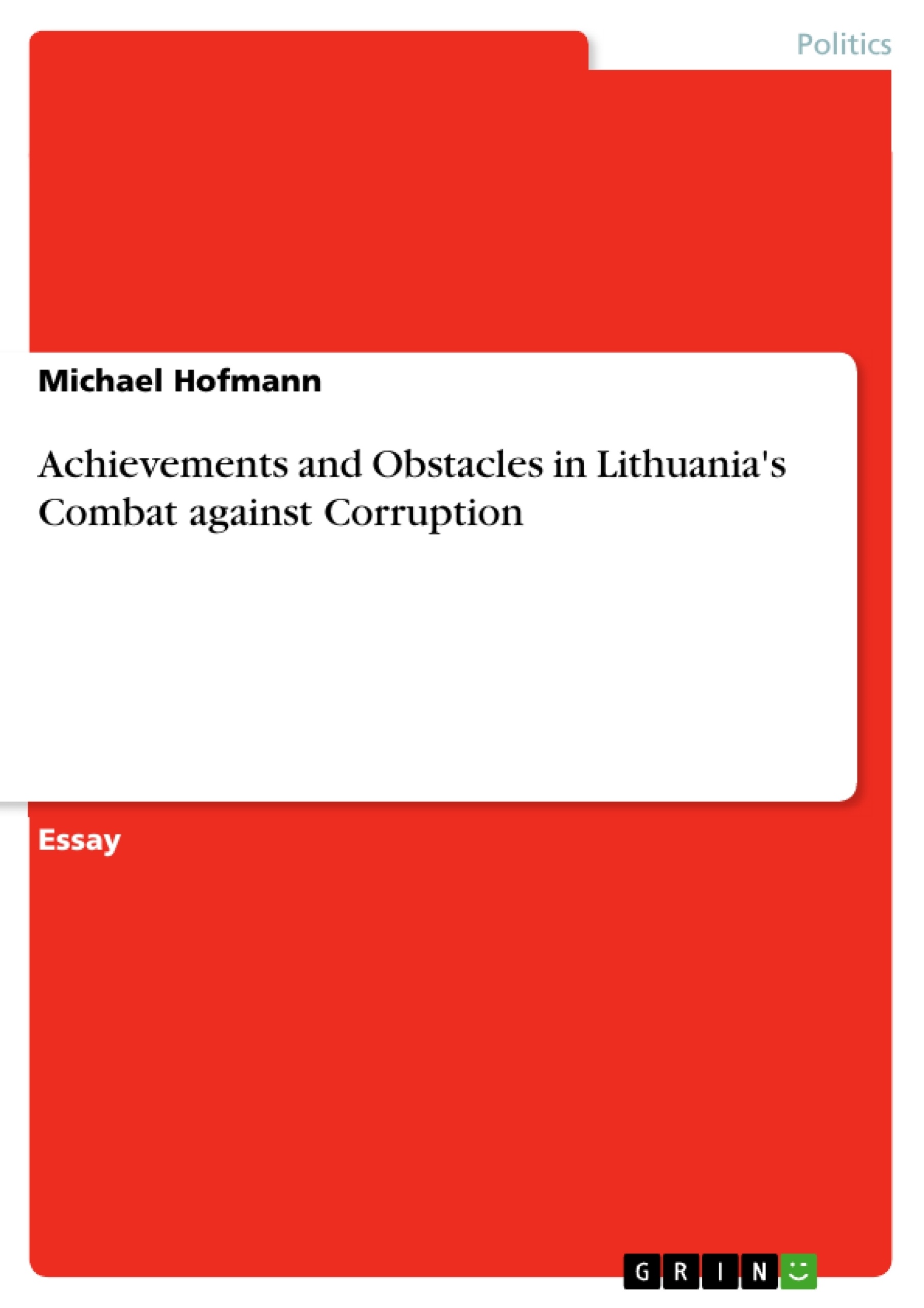Excerpt
Contents
1. Introduction
2. The current state of corruption in Lithuania
3. Taken measures to combat corruption in Lithuania
4. Impediments for Accountability and Transparency
5. Conclusions
6. References
1. Introduction
Togehter with nine other countries Lithuania successfully completed the accession negotiations with the European Union earlier this year and consequently became a member of this supranational political oranisation. That was the climax of a development that lasted 13 years and started with Lithuania being a Soviet Republic and ended with its Accession to the European Union. The development was catalysed by deep reforms at all levels of the young republic: Privatisation of former state-owned property[1], adaption of legal requirements towards the EU accession[2] to mention some fields of reform.
Also, various reforms concering public administration were made in order to strenghthen accountability within the framework of public services. The main acts in this regard are the “Government Resolution on Internal Audit of State Enterprises and Institutions” (February 2001), “The Law on the Civil Service” (2000) and the “National Anti-Corruption Programme of the Republic of Lithuania” (January 2002).
These measures were necessery, due to the lack of accountability in public services. Or, as Girnius put it, “corruption is endemic” in Lithuania (Girnius 1999: 54). In particular, so-called “Administrative Corruption” is a major problem in Lithuania. A 2000 published World Bank research[3] categorised Lithuania as a country of high level administrative corruption – only followed by Romania and Albania (regarding the Central-Eastern European Countries). The problem is not only restricted to the administrative level.
According to the more general 2004 Transparency International’s Corruption Perception Index (CPI) Lithuania holds the 44th position among 145 countries. This state of Intransparency seems not to be unusal taking into account the position of other Central and Eastern European transition states.[4]
Nevertheless, Lithuania has fallen behind countries like Botswana, Jordan, Malaysia, Tunisia and Costa Rica. Furthermore, there is ground for concerns, since Lithuanian´s CPI absolute score of 4.6 (out of 10 – the highest) has not improved during the last surveys that were conducted and including Lithuania since 1999. On the contrary, Lithuania has lost ground, respectively stagnates regarding this objective Index. This development is showed in the following table:
Development of Lithuania’s rank at the Transparency International’s Corruption Perception Index (CPI) over the last years[5]
Abbildung in ieser Leseprobe nicht enthalten
The main objective of this paper is to examine the progress of Lithuania´s combat against corruption. Therefore it is first necessary to analyse the current situation concering the corruption issue in Lithuania. The second part of this paper will put the focus on the measures taken by Lithuania´s government to promote Transparency. Further, the main impediments concerning an effective containment of corruption are identified before some conclusions are drawn in the last part of the essay.
2. The current state of corruption in Lithuania
As mentioned above, Lithunia shares its comparatively high level of corruption concering the CPI with other transition countries of Central and Eastern Europe. On the other hand, the level of administrative (or bureaucratic) corruption is the highest in the biggest of the Baltic States – as the World Bank report revealed.
The European Commission’s Comprehensive monitoring report (2003) on Lithuania’s preparations for membership also states, “the reform of public administration is well on track, notably in terms of increased stability and professionalism of the civil service. Continued efforts and resources remain necessary to consolidate the administrative system, which is still fragile […] particular attention should be paid to the tackle corruption problems in a systematic and effective way and to ensure adequate prevention”.[6]
[...]
[1] Law on the Privatisation of State-Owned and Municipal Property (1997) – No. VIII-480
[2] National Programme for the Adoption of the Acquis (European Union Accession Strategy), 1999
[3] Hellman/Jones/Kaufman: „Seize the State, seize the Day” – State Capture, Corruption and Inluence in Transition (2000), World Bank
[4] Estonia ranks 44th with a score of 6,0, Czech Republic 51st/4,2; Hungary 42th/4,8; Latvia 57th/4,0; Slovakia 57th/4,0
[5] The Corruption Perception Index can be found at: http://www.transparency.org/surveys/index.html#cpi
[6] Comprehensive monitoring report on Lithuania’s preparations for membership (November 2003)
- Quote paper
- Michael Hofmann (Author), 2004, Achievements and Obstacles in Lithuania's Combat against Corruption, Munich, GRIN Verlag, https://www.grin.com/document/61990
Publish now - it's free






















Comments